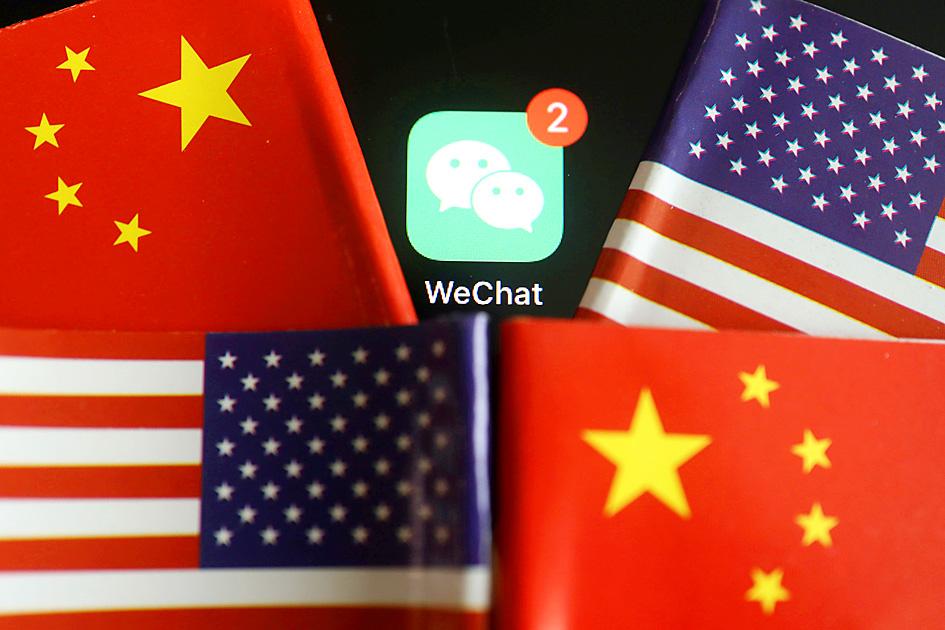The US Department of Justice yesterday asked a federal judge in San Francisco to allow the government to bar Apple Inc and Alphabet Inc’s Google from offering WeChat for download in US app stores pending an appeal.
The filing asked US Magistrate Judge Laurel Beeler to put on hold her preliminary injunction issued last Saturday. That injunction blocked the US Department of Commerce order which was set to take effect at the beginning of this week and that would also bar other US transactions with Tencent Holding Ltd’s (騰訊) WeChat, potentially making the app unusable in the US.
The justice department filing said that Beeler’s order was in error and “permits the continued, unfettered use of WeChat, a mobile application that the Executive Branch has determined constitutes a threat to the national security and foreign policy of the United States.”

Photo: Reuters
Tencent had put forward a “mitigation proposal” that sought to create a new US version of the app; deploy specific security measures to protect the new app’s source code; partner with a US cloud provider for user data storage; and manage the new app through a US-based entity, the filing said.
However, its proposal still allowed Tencent to retain ownership of WeChat and did not address US concerns over the company, it added.
Tencent declined to comment.
The US WeChat Users Alliance, the group behind the legal challenge to the WeChat ban, did not immediately respond to a request for comment.
In support of its argument, the justice department made public portions of a Sept. 17 commerce department memo outlining the WeChat transactions to be banned.
“The WeChat mobile application collects and transmits sensitive personal information on US persons, which is accessible to Tencent and stored in data centers in China and Canada,” the memo said.
Beeler said that WeChat users who filed a lawsuit “have shown serious questions going to the merits of the First Amendment claim.”
The justice department filing said that “the First Amendment does not bar regulation of WeChat simply because it has achieved the popularity and dependency sought by [China], precisely so it can surveil users, promote its propaganda, and otherwise place US national security at risk.”
WeChat has an average of 19 million daily active users in the US, analytics firms Apptopia said early last month. It is popular among Chinese students, Americans living in China and Americans who have personal or business relationships in China.
Beeler wrote that “certainly the government’s over-arching national-security interest is significant. But on this record — while the government has established that China’s activities raise significant national security concerns — it has put in scant little evidence that its effective ban of WeChat for all US users addresses those concerns.”

Nvidia Corp chief executive officer Jensen Huang (黃仁勳) on Monday introduced the company’s latest supercomputer platform, featuring six new chips made by Taiwan Semiconductor Manufacturing Co (TSMC, 台積電), saying that it is now “in full production.” “If Vera Rubin is going to be in time for this year, it must be in production by now, and so, today I can tell you that Vera Rubin is in full production,” Huang said during his keynote speech at CES in Las Vegas. The rollout of six concurrent chips for Vera Rubin — the company’s next-generation artificial intelligence (AI) computing platform — marks a strategic

REVENUE PERFORMANCE: Cloud and network products, and electronic components saw strong increases, while smart consumer electronics and computing products fell Hon Hai Precision Industry Co (鴻海精密) yesterday posted 26.51 percent quarterly growth in revenue for last quarter to NT$2.6 trillion (US$82.44 billion), the strongest on record for the period and above expectations, but the company forecast a slight revenue dip this quarter due to seasonal factors. On an annual basis, revenue last quarter grew 22.07 percent, the company said. Analysts on average estimated about NT$2.4 trillion increase. Hon Hai, which assembles servers for Nvidia Corp and iPhones for Apple Inc, is expanding its capacity in the US, adding artificial intelligence (AI) server production in Wisconsin and Texas, where it operates established campuses. This

SEMICONDUCTORS: The German laser and plasma generator company will expand its local services as its specialized offerings support Taiwan’s semiconductor industries Trumpf SE + Co KG, a global leader in supplying laser technology and plasma generators used in chip production, is expanding its investments in Taiwan in an effort to deeply integrate into the global semiconductor supply chain in the pursuit of growth. The company, headquartered in Ditzingen, Germany, has invested significantly in a newly inaugurated regional technical center for plasma generators in Taoyuan, its latest expansion in Taiwan after being engaged in various industries for more than 25 years. The center, the first of its kind Trumpf built outside Germany, aims to serve customers from Taiwan, Japan, Southeast Asia and South Korea,

Garment maker Makalot Industrial Co (聚陽) yesterday reported lower-than-expected fourth-quarter revenue of NT$7.93 billion (US$251.44 million), down 9.48 percent from NT$8.76 billion a year earlier. On a quarterly basis, revenue fell 10.83 percent from NT$8.89 billion, company data showed. The figure was also lower than market expectations of NT$8.05 billion, according to data compiled by Yuanta Securities Investment and Consulting Co (元大投顧), which had projected NT$8.22 billion. Makalot’s revenue this quarter would likely increase by a mid-teens percentage as the industry is entering its high season, Yuanta said. Overall, Makalot’s revenue last year totaled NT$34.43 billion, down 3.08 percent from its record NT$35.52